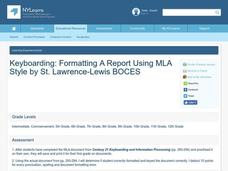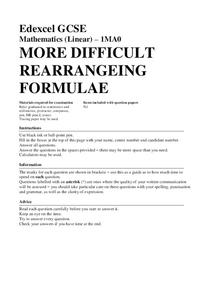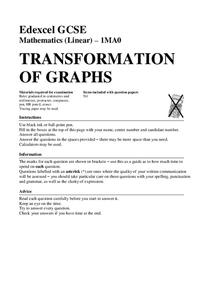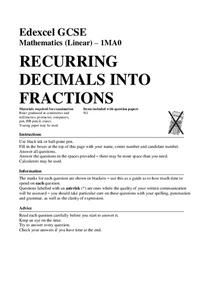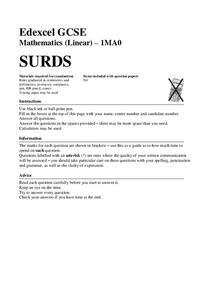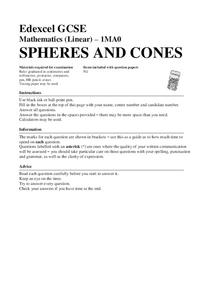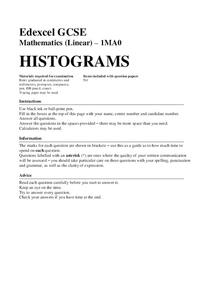Curated OER
Documenting Texas Women’s History through Photographs
Students explore women’s history. In this women’s studies lesson, students will examine seven photographs that depict prominent female figures from Texas’s history. Students will engage in a discussion of the photographs as a mode of...
Curated OER
Keyboarding: Formatting a Report Using MLA Style
Keyboarding is one of the most basic skills needed to master modern technology, and it's also one of the most important. The class uses Century 21 Keyboarding and Information Processing to guide their hands in typing a report in the...
Curated OER
Sentence Train
What child doesn't like trains? Use this fun idea to practice writing. Young readers learn to write complete sentences by using a train graphic organizer made out of construction paper. Each section of the train (engine, boxcar, and...
Curated OER
Car For Sale!
Car For sale! In this GED prep lesson, writers develop a classified advertisement to sell a car. After a discussion of precise words and phrases, telling details, and sensory language, sellers draft their ad for review, revision and...
Curated OER
Truly Amazing Mammals
Explore the world of amazing mammals with your kids with special needs. Each child identifies one mammal from a previous lesson and writes a short paragraph on that mammal. This lesson states that it is intended for all levels, but not...
Curated OER
Peer Editing Form
Save time by downloading a template for peer editing. Included, you will find a one-form-per-page format and a four-forms-per-page format.
Super Teacher Worksheets
Last Day of School
As summer quickly approaches, take a few minutes for young learners to reflect back on their favorite memories of the year. These three short response questions ask children to think about their academic and social achievements, while...
Mathed Up!
Cumulative Frequency and Box Plots
Learn how to display data. Young data analysts watch a video to review how to create cumulative frequency histograms and box plots. They work on a set of questions to practice producing these data displays.
Mathed Up!
Simultaneous Equations
How do you solve systems of linear equations? Scholars watch a video to learn how to solve systems using elimination-combination. After viewing the video, they solve seven systems of equations.
Mathed Up!
Quadratic Formula
Young scholars explore how to solve any quadratic equation with a video about the quadratic formula. They then use the quadratic formula to solve a set of quadratic equations.
Mathed Up!
Algebraic Fractions
Learn ways to simplify algebraic fractions with a video that reviews how to simplify rational expressions by canceling common factors and how to add and subtract simple rational expressions. A worksheet tests pupils' understanding of the...
Mathed Up!
More Difficult Rearranging Formulae
How do you solve equations with more than one variable? Scholars view a video that explains solving literal equations as simply an extension of solving simple equations. Once they have a handle on the concept, they work on several...
Mathed Up!
Simultaneous Equations with a Quadratic
Viewers discover how to solve quadratic-linear systems with a video that first explains the substitution method for solving a system of equations involving a quadratic. Scholars then complete a worksheet of practice problems.
Mathed Up!
Transformation of Graphs
In what ways can you transform a graph? An engaging video answers this question as it covers reflections, translations, and stretches of graphs. To test their knowledge, individuals complete a set of problems to apply this knowledge.
Mathed Up!
Sine and Cosine Rules and Area of Triangles
Learners discover how to find missing sides and angles using trigonometry. Scholars first watch a video covering the Law of Sines and Cosines, as well as the area formula for a triangle. To test their knowledge, they complete a worksheet...
Mathed Up!
Recurring Decimals
Explore how to convert repeating decimals to fractions with an informative video that teaches young mathematicians how to translate between decimals and fractions. After viewing, individuals complete a set of problems to practice this...
Mathed Up!
Surds
Young mathematicians learn how to simplify expressions with square roots by watching a video that shows several ways to rewrite expressions involving radicals. They work on questions where they rationalize denominators and expand and...
Mathed Up!
Direct and Inverse Proportionality
Direct your young mathematicians to a resource on direct and inverse variation. A video first reviews concepts on direct and inverse proportionality. Individuals then answer a set of questions in pure and applied mathematics involving...
Mathed Up!
3-D Pythagoras
Apply the Pythagorean Theorem in three-dimensional shapes. Young mathematicians watch a video that takes them through several examples of using the Pythagorean Theorem to solve problems involving lengths in three-dimensional figures. A...
Mathed Up!
Spheres and Cones
Class members learn how to apply formulas for spheres and cones with a video that begins with a review of the formulas for surface area and volume of spheres and cones. Pupils use these formulas to solve problems on a worksheet.
Mathed Up!
Histograms
Class members explore how to read and use histograms by watching a video on creating and analyzing histograms. To finish, the class works on a set of questions that tests these skills.
Curated OER
Modern Translation : Julius Caesar: B2
Young scholars, while being critiqued by a vigorous rubric, write, edit and perform a modern translation of Julius Caesar. All of the other students and the teacher watch the presentations and then critique them.
Curated OER
Story Writng: To Kill a Mockingbird: B1
High schoolers are given the story To Kill a Mockingbird and a rubric before starting their writing project. They are aware of the guidelines that the teacher is using in order for students to obtain their passing grade.
Curated OER
Making a Board Game: Macbeth B2
Young scholars are given a rubic for their project on Making a Board Game. They can see how the points are broken down and what they have to do in order to recieve a great grade. Students are given 6 different categories that they can...



